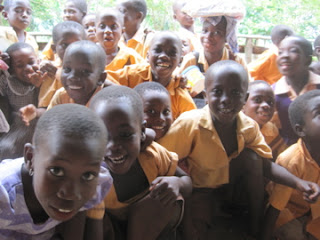Saviefe Deme is the name of the village where I volunteer as a teacher. The village is about 25 minutes away by taxi, and the ride there is absolutely gorgeous. The main road that we take to get there passes through a dozen other small villages so we get to see the lifestyle of the locals everyday. In the mornings the kids are all walking to school, and everyone else is strolling about, doing their business. The older men and women are either carrying absurd amounts of weight on their heads, sweeping their compounds, or selling things on the street. Products for sale include food (both raw and prepared) and phone cards. As a matter of fact, many villagers set up stands that sell both food and phone cards. Why phone cards? Because everyone in Ghana has a cell phone. Don’t ask me why.
Anyway, at the school I teach a class of 11-14 year-olds. In rural Ghana they group classes by ability rather than age. On my first day, I sat-in on an English lesson. I was surprised at the poor level of English of the students. Later on, however, I realized that they are actually pretty fluent in English and were just freaked out that there was a yavu (white person) sitting in the class. Their teacher’s name is Sara. When I got there, I started wondering why they wanted volunteers for a school that had plenty of teachers. Then, on the second day, three of the teachers didn’t show up because they had business in Ho. I began to understand what the deal really is. The class composure is never the same every day, and the same can be said of the teachers. If the teacher finishes her thoughts and there is still an hour before lunch, then the kids can expect to have a nice hour to play soccer. If the teacher doesn’t really understand the material, she won’t teach it. In fact, the Ghanaian public school curriculum is very intense. The kids were supposed to learn about P-N junctions (physics) this week. Sara asked me if I could teach it. “Sure. Do they know what electricity is?” Of course not. There isn’t even electricity in the school.
The kids fail the national examinations every year. They don’t have lab equipment, so there are no labs. They don’t have much paper, so they don’t learn to write well. After I finished my lesson on the day that the teacher was gone, they wanted to hear a story. They handed me a stack of story books suited for 5 year-olds. English is not there native language, but it’s still a huge shock compared to the U.S.
Next week I will begin teaching regularly. I wish it were a month ago. Sara is very sweet, and she tries hard, but she is not suited to teach the curriculum that she is given. It’s no ones fault. The curriculum is built to bring the kids up to the level of us First World’ers, which probably works well in the cities. But in the villages, forget about it. How can you convince a well-educated teacher to move out to the middle of the jungle and teach 5th grade? It’s a little bit sad sometimes, but then I look out the window and see all the kids running around and playing as if they all just won the lottery. There is no such thing in America, not even close.
-Jon Holt




No comments:
Post a Comment